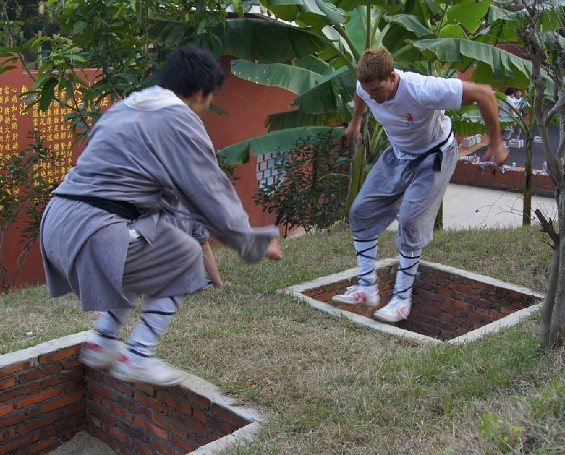- 当前位置:首页 > 传统文化 > 中国人的姓名<<关闭窗口
-
中国人的姓名
发布时间:2013-07-04 来源:中国南粤禅武文化网 [浏览次数:365 ]
中国人的姓名
中国人的姓产生在母系氏族社会,那时候,人们以母亲为中心组成一个个的氏族,为了相互区别,就把姓作为氏族的称号。
姓的来源,大概有以下几种情况:一、母系氏族社會,以母親的名為姓,所以,很多古姓都有“女”字旁,如姜(jiang)、姚(yao)、姬(j1)等,就連“姓”字本身也是由“女”、“生”二字合成的。二、以远古时代人们崇拜的生物为姓,如马、牛、羊、龙等。三、以祖先的国家为姓,如赵、宋、秦、吴等。四、以祖先的官职为姓,如司马、司徒等古代官职,就成了后代子孙的姓。五、以祖先的爵位为姓,如王、侯等。六、以住地的方位和景物为姓,如东郭、西门、池、柳等。七、以职业为姓,如做陶器的人姓陶。八、以祖先的名号为姓,如中国人的祖先黄帝名叫轩辕,后来,轩辕就成了一个姓。
中国人的姓有一个字的,也有两个字和两个字以上的。一个字的是单姓,两个字或两个字以上的是复姓。中国到底有多少个姓,到现在也没有准确的统计数字。宋朝时,有个读书人写了一本《百家姓》,里面收有500多个姓,其中60个是复姓。中国科学院遗传与发育生物学研究所研究人员经过多年的收集和研究,结果发现中国人古今姓氏已超过22,000个,这是至今有关中国人姓氏最多的统计记录。当代中国人正在使用的汉姓约有3,500个左右。在其中100个常见姓氏中,全国最大的三个姓氏是李、王、张,诸葛、欧阳、司徒、司马等是中国最常见的复姓。
中国人的名也具有自己的传统和特点。中国人的姓名都是姓在前,名在后。名有一个字的,也有两个字的。同一家族中的人,名字要按辈份排列,同辈人的名字里,往往要有一个相同的字。古人的姓名比现代人的复杂,有文化、有地位的人除了姓、名以外,还有字和号。如:宋代文学家苏轼(sh1),姓苏,名轼,字子瞻(zhan),号东坡。唐代诗人李白幼年时居住在四川的青莲乡,他就给自己取号“青莲居士”。
中国人的名字往往有一定的含义,表示某种愿望。有的名字中包含?出生时的地点、时间或自然现象,如“京”、“晨”、“冬”、“雪”等。有的名字表示希望具有某种美德,如“忠”、“义”、“礼”、“信”等。有的名字中有表示希望健康、长寿、幸福的意思,如“健”、“寿”、“松”、“福”等。男人的名字和女人的名字也不一样,男人的名字多用表示威武勇猛的字,如“虎”、“龙”、“雄”、“伟”、“刚”、“强”等。女人的名字常用表示温柔美丽的字,如“凤”、“花”、“玉”、“彩”、“娟”、“静”等。
现在,中国人起名已经没有古人那么多的讲究了。一般只有小名、大名,名字也不一定按辈份排列了。
Names of Chinese People
The surnames of Chinese people appeared during the matriarchal society, when clans were constituted with mothers at the center. And clans distinguished themselves from each other by using the name.
The surname has roughly several origins as follows: 1. With the first name of the mother as the surname of the clan in matriarchal society. Thus, many ancient surnames have a basic structural part of 女 (meaning "female"), such as 姜, 姚, and 姬, and the Chinese character for surname 姓 is also composed of 女 and 生 (meaning "giving birth to"). 2. With the creatures worshipped in remote antiquity as the surname, such as 马 (horse), 牛 (cattle), 羊 (sheep), 龙 (dragon), etc. 3. With ancient states?names as the surname, such as 赵 (Zhao), 宋 (Song), 秦 (Qin), 吴 (Wu), etc. 4. With ancient official titles eventually adopted as the surname, such as 司马 (Sima) and 司徒 (Situ). 5. With the rank or title of nobility as the surname, such as 王 (prince) and 侯 (marquis). 6. With the location and scene in residential places as the surname. For example, 东郭, 西门 (western gate), 池 (pond), 柳 (willow), etc. 7. With the profession as the surname. For instance the person who makes pottery has the surname of 陶 (pottery). 8. With ancestors' official and courtesy names as the surname. For example, the Chinese nation's ancestor was named 轩辕 (Xuanyuan), which later became a surname.
Up to now, there is no exact statistic on how many surnames there are in China. In the Song Dynasty, an intellectual wrote the Book of China's Family Names, covering more than 500 surnames among which over 60 are compound ones. Having collected material and researched for many years, research personnel in the Research Institute of Genetics and Development Biology in the Academy of Sciences recently found that the surnames of the Chinese from ancient times to the present exceeded 22,000. Contemporary Chinese use about 3,500 Chinese surnames. Among the 100 commonly used surnames, the three commonest are Li, Wang and Zhang; Zhuge, Ouyang, Situ and Sima are the commonest compound surnames.
In China, the surname comes first followed by the given name, and the latter has its own traditions and features. It can have one or two characters. In the same clan, the given name is arranged in the order of seniority in the family hierarchy. And the given names of peers usually have one Chinese character in common if there are more than one characters in their given names. The names of ancient men were more complicated than those of modern people. People of literacy and status have both a style name and alternative name, along with the surname and given name. For example, a man of letters Su Shi in the Song Dynasty had the style name Zizhan and the alternative name Dongpo. The poet Li Bai in the Tang Dynasty lived in the Qinglian Village in Sichuan Province in his childhood, and thus he styled himself "Qinglian Jushi (retired scholar)".
Chinese names usually have a certain meaning, expressing some kind of wish. Some names embody the location, time or natural phenomenon when the person was born, such as "Jing (Beijing)","Chen (morning)","Dong (winter)" and "Xue (snow)". Some names indicate the expectation of possessing some virtues, such as "Zhong (loyalty)", "Yi (justice)", "Li (etiquette)", and "Xin (faith)". Some names have the meaning of health, longevity and happiness, such as "Jian (health)", "Shou (longevity)", "Song (pine, representing longevity)" and "Fu (happiness)" Male names are different from female ones: men's names usually have the character meaning power and vigor, such as "Hu (tiger)", "Long (dragon)", "Xiong (grandeur)", "Wei (magnificence)", "Gang (hardness)" and "Qiang (strength)". And the names of females usually use characters representing gentleness and beauty, such as "Feng (phoenix)", "Hua (flower)", "Yu (jade)", "Cai (colors)", "Juan (graceful)", and "Jing (calmness)".
Nowadays, the Chinese do not pay as much attention to naming, as did ancient folk. Generally a person has an infant namec and an official named, and the given names are not necessarily arranged in the order of the seniority in the family hierarchy.
【来源:中国华文教育网】
- 热门文章
-
- [2018.07.03]香港禅武堂拜访禅武国际联盟主席王德庆老师
- [2018.01.06]禅武国际联盟培养洋弟子促进中外人文交流
- [2014.03.22]禅武中心五周年邀请以及2014年办班计划
- [2023.11.28]匈牙利禅武国际联盟成功举办20周年庆典活动
- [2015.04.11]香港惠州新动力启动与禅武中心共建禅武夏(冬)令营五周年规划















